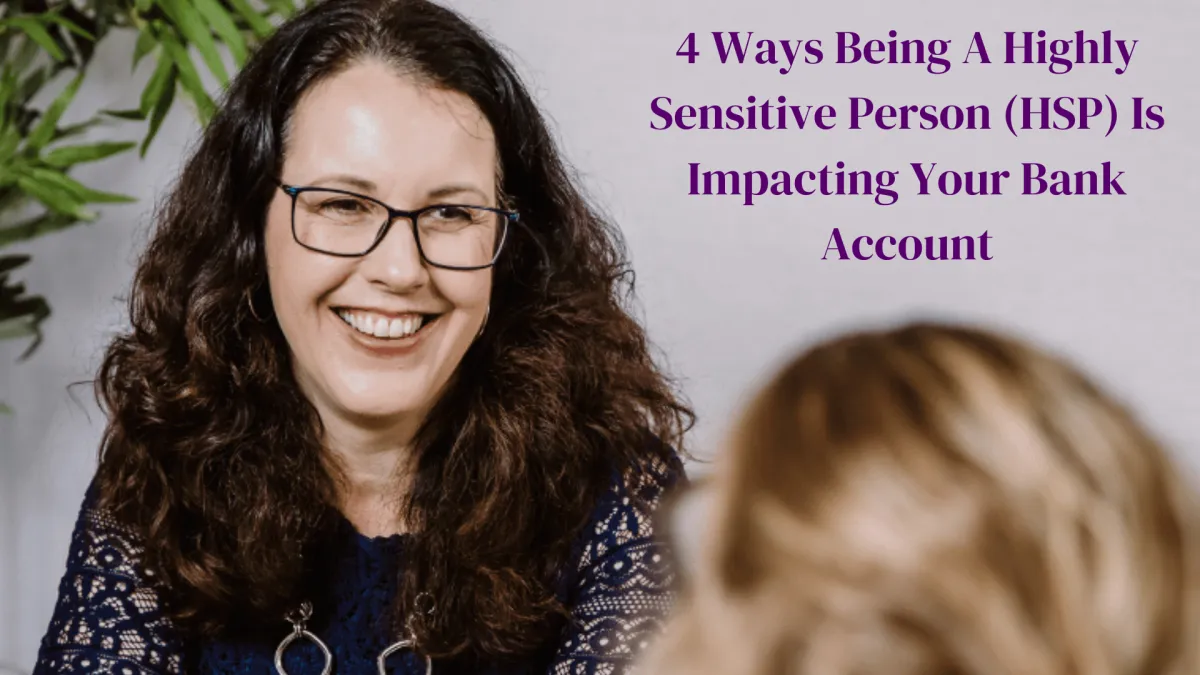
4 Ways Being A HSP Is Impacting Your Bank Account
4 Ways Being A Highly Sensitive Person (HSP) Is Impacting Your Bank Account
In today's fast-paced, high-stress world, being a Highly Sensitive Person (HSP) can feel like both a blessing and a curse. On the one hand, heightened sensitivity can lead you to having deeper connections and greater empathy; on the other, it can result in you feeling overwhelmed, anxious, and stressed. But how does this unique trait that affects 30% of the population, impact your finances?
Here’s 4 ways that being an HSP can influence your money management, spending habits and willingness to make sales, and the strategies to harness your sensitivity to improve your bank account.
The Financial Challenges of Being an HSP
1. Impulse Spending as Emotional Relief
Highly sensitive people (HSP’s) often experience emotions more intensely than others, which means that their heightened emotional state can lead to impulse spending as a form of self-soothing. Whether it's splurging on a new gadget, new clothes, or comfort food, HSPs can find themselves spending money to alleviate stress or anxiety.
Strategy: Develop mindful spending habits. Before making a purchase, take a moment to think whether this purchase is a need or a want. Putting items in the shopping cart and then implementing a 24-hour rule before making non-essential purchases can help you manage those pesky feelings and help you stop overspending
2. Avoidance of Financial Management Due to Overwhelm
Financial tasks such as budgeting, investing, or even opening bills can feel overwhelming for HSPs, especially when money is tight but avoidance can lead to financial disorganization, missed payments, and unnecessary fees.
Strategy: Take 5 minutes to do some mindful breathing and destress before attempting any financial tasks such as checking your bank account. Break financial tasks into manageable chunks. Instead of tackling your entire budget in one sitting, allocate specific tasks to different days of the week. You can look at utilizing financial apps that can automate bill payments and track expenses, helping you to reduce your stress (personally I like old-fashioned Excel spreadsheets).
3. High Spending on Self-Care and Stress Relief
HSP’s have often grown up in families with no understanding of their trait. As such they may have been punished, criticised or judged harshly for being too sensitive. Many HSP’s also come from families which have undergone some form of trauma, whether that’s divorce, loss of a parent, poverty or mental illness, which they experience more deeply than others and which may have increased their sense of being ‘different’ to others. Many HSP’s can also have high ACE (Adverse Childhood Experience) scores without realising it - check your score here: https://www.mdcalc.com/calc/10464/adverse-childhood-experiences-ace-score
As a result HSPs may invest heavily in activities and products aimed at reducing stress and promoting well-being. While prioritizing self-care is crucial, it can sometimes lead to overspending on massages, therapy, retreats, or wellness products which fail to heal the underlying trauma
Strategy: Because of the lack of understanding about the HSP’s experience, HSP’s are often unaware of what is causing their experiences and so buy products rather than making use of free resources which they have access to. Free or low-cost stress-relief activities such as meditation, nature walks, or creative hobbies can be easily incorporated into a daily routine. Whilst professional help with trauma healing may also be needed. Having fun doesn’t require having a budget but the long term impact of trauma can make experiencing fun and joy difficult.
4. Being a HSP makes us empathetic but also poor
Being highly sensitive means that you feel your clients pain, deeply. You’ve probably been in your clients shoes and that’s why you’re so passionate about your business. And you know you’ve found the solution and you want to share it. That passion is good for your business but it has its drawbacks for your bank account
It feels so right to you to help others that it seems wrong to charge people for what you do. HSP’s cn often have other limiting beliefs about ‘its not spiritual to charge people’ or they may have a ‘rescue’ belief that keeps them earning ‘pocket money’ and unable to become the main breadwinner (even though many HSP’s really want this). This makes for weak boundaries, giving away time and effort for free and feeling uncomfortable when asking for money
Strategy: Learning how to self-regulate your emotions, will ensure you stay in your ‘lane’ rather than being overwhelmed by the other person’s pain. Recognising the value that being a HSP brings to your clients enables you to set boundaries and charge your worth
Being a Highly Sensitive Person undoubtedly impacts your relationship with money, bringing both challenges and advantages to you and your business. By understanding how your sensitivity influences your financial habits, you can develop strategies to mitigate the drawbacks and leverage your strengths.
Embrace your sensitivity as a unique asset, and with the right mindset, you can create a healthy and fulfilling financial life. Your sensitivity is not a weakness; it’s a powerful tool that, when harnessed correctly, can lead to a healthy bank account and lots more happy clients
I'm Carolyn Whitehouse, a HSP Money Psychologist, helping Highly Sensitive business owners to feel calm, confident and cpable with money. If you'd like to know more book a free 30min Curiosity Call with me and let's talk: https://serve.heartleader.uk/widget/bookings/30-min-curiosity-call